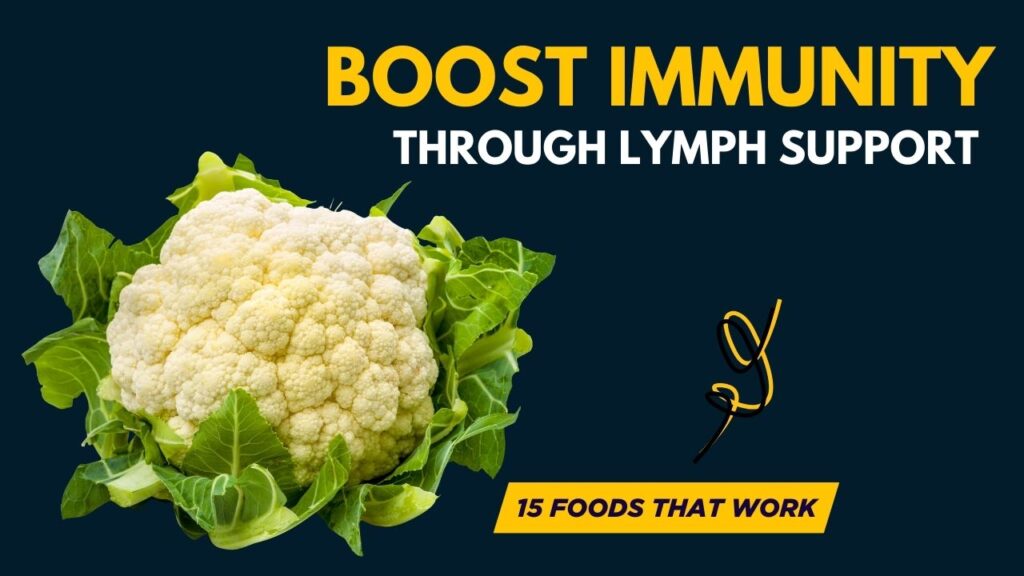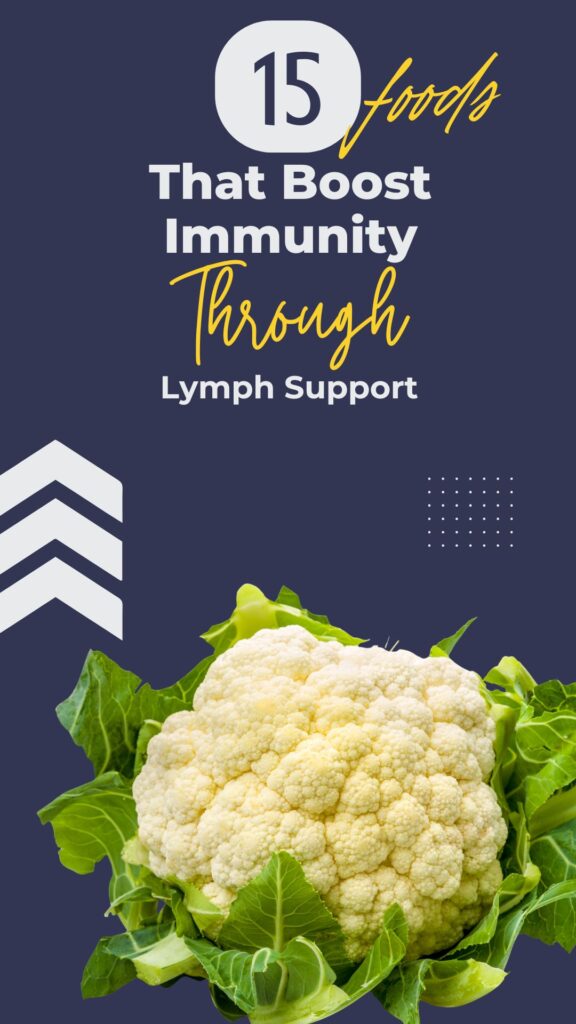Some links in this blog are affiliate links. If you make a purchase through these links, I may receive a small commission. This helps support the site at no extra cost to you.
Do you know that your lymphatic system plays a far greater role in immunity than most people realize?
Often overshadowed by the bloodstream, the lymphatic network works tirelessly behind the scenes, filtering out toxins, carrying white blood cells, and transporting nutrients. Without proper lymph support, your body may struggle to fight infections, leaving you fatigued and vulnerable.
Now here’s the surprising fact: the foods you eat directly impact how efficiently your lymph system functions. Certain nutrient-dense foods help flush toxins, reduce inflammation, and strengthen immune cells—keeping illnesses at bay naturally.
In this article, we’ll explore 15 powerful foods that boost immunity through lymph support. You’ll also learn:
- The best ways to eat or use each food.
- Who should prioritize them and who should be cautious.
- How to buy and store them for maximum freshness.
- Common do’s and don’ts to avoid nutrient loss.
- Possible side effects if overconsumed.
Let’s dive into the foods that can keep your immune defenses strong by nourishing your lymph system.

Table of Contents

15 Best Foods That Boost Immunity
1. Garlic
Garlic has been celebrated for centuries as a natural immune booster thanks to its compound allicin, which helps the body ward off infections. It also stimulates lymph circulation, ensuring toxins don’t linger in the body.
Best Ways to Eat or Use It
- Raw in salad dressings.
- Lightly sautéed in stir-fries.
- Blended into soups and stews.
Who Should Eat / Avoid
- Good for: people prone to frequent colds, those with sluggish digestion.
- Avoid if: you have a sensitive stomach, ulcers, or are on blood-thinning medication.
Storage & Buying Tips
- Choose firm, plump cloves without green shoots.
- Store in a cool, dry place—not in the fridge.
Do’s & Don’ts
✅ Do: crush garlic and let it sit for 10 minutes before cooking (this activates allicin).
❌ Don’t: overcook—it destroys key compounds.
Possible Side Effects
- Excess can cause bloating or heartburn.
2. Ginger
Ginger improves circulation, reduces inflammation, and enhances lymphatic drainage. Its active compound, gingerol, fights oxidative stress and boosts immune response.
Best Ways to Eat or Use It
- Fresh ginger tea.
- Grated into soups or curries.
- Smoothies with lemon and honey.
Who Should Eat / Avoid
- Good for: people with joint pain, athletes, and those prone to nausea.
- Avoid if: pregnant women in late stages, or those with gallstones.
Storage & Buying Tips
- Buy firm, smooth roots.
- Store unpeeled in the fridge for up to 3 weeks.
Do’s & Don’ts
✅ Do: peel ginger thinly to retain nutrients.
❌ Don’t: rely only on dried ginger—it’s less potent.
Possible Side Effects
- High amounts may thin blood or cause acid reflux.
3. Turmeric
Often called “liquid gold for the immune system,” turmeric contains curcumin, a powerful anti-inflammatory that supports lymph detox and immune cell production.
Best Ways to Eat or Use It
- Golden milk (turmeric latte).
- Mixed in curries.
- Added to roasted vegetables.
Who Should Eat / Avoid
- Good for: people with chronic inflammation or weak immunity.
- Avoid if: you’re on blood thinners or have gallbladder issues.
Storage & Buying Tips
- Fresh turmeric root is stronger than powder.
- Store powder in an airtight container away from sunlight.
Do’s & Don’ts
✅ Do: pair turmeric with black pepper for better absorption.
❌ Don’t: take in high doses without medical advice.
Possible Side Effects
- Can cause digestive upset in excess.
4. Leafy Greens (Kale, Spinach, Swiss Chard)
Leafy greens are loaded with chlorophyll, which naturally cleanses lymph and boosts immune activity. They’re also rich in vitamin C and antioxidants.
Best Ways to Eat or Use It
- Green smoothies.
- Steamed or sautéed with garlic.
- Fresh salads.
Who Should Eat / Avoid
- Good for: weight-loss seekers, heart health, and those fighting fatigue.
- Avoid if: you have kidney stones (high oxalate content).
Storage & Buying Tips
- Choose crisp, dark-colored leaves.
- Wrap in a damp cloth in the fridge to extend freshness.
Do’s & Don’ts
✅ Do: wash thoroughly before eating.
❌ Don’t: overcook—they lose nutrients.
Possible Side Effects
- Overeating may cause bloating due to fiber.
5. Citrus Fruits (Oranges, Lemons, Grapefruit)
Packed with vitamin C, citrus fruits enhance lymph detoxification and strengthen immune cells. Their natural acidity also helps balance body pH.
Best Ways to Eat or Use It
- Fresh juice or infused water.
- Salads with orange slices.
- Lemon squeezed over cooked dishes.
Who Should Eat / Avoid
- Good for: smokers (to restore vitamin C), students, and those with frequent colds.
- Avoid if: you have acid reflux or citrus allergies.
Storage & Buying Tips
- Choose heavy fruits with firm skin.
- Store at room temperature or in the fridge.
Do’s & Don’ts
✅ Do: eat the white pith under the skin—it’s high in bioflavonoids.
❌ Don’t: add too much sugar to juices.
Possible Side Effects
- Can erode tooth enamel if consumed excessively.
6. Berries (Blueberries, Strawberries, Raspberries)
Berries are antioxidant powerhouses that protect lymph vessels and enhance immune defense.
Best Ways to Eat or Use It
- Smoothies or yogurt bowls.
- Fresh snack.
- Added to oatmeal.
Who Should Eat / Avoid
- Good for: people at risk of chronic diseases, weight-conscious individuals.
- Avoid if: allergic to strawberries or on blood-thinning meds (due to vitamin K).
Storage & Buying Tips
- Buy firm, bright-colored berries.
- Store in fridge; wash only before eating.
Do’s & Don’ts
✅ Do: eat fresh for max benefits.
❌ Don’t: freeze for too long—it reduces antioxidants.
Possible Side Effects
- May cause stomach upset in excess.
7. Green Tea
Green tea is rich in catechins, which improve lymph flow and enhance the body’s detox process.
Best Ways to Eat or Use It
- Brewed hot tea.
- Cold-brew for summer drinks.
- Matcha in smoothies.
Who Should Eat / Avoid
- Good for: those seeking fat loss, students (for focus).
- Avoid if: sensitive to caffeine or have insomnia.
Storage & Buying Tips
- Store loose leaves in airtight tins.
- Avoid damp places.
Do’s & Don’ts
✅ Do: steep for 2–3 minutes.
❌ Don’t: boil leaves—it kills antioxidants.
Possible Side Effects
- Too much may cause jitters or upset stomach.
8. Nuts & Seeds (Almonds, Walnuts, Flaxseeds, Chia)
These are rich in omega-3 fatty acids and vitamin E, both of which support lymph flow and immune resilience.
Best Ways to Eat or Use It
- Handful as snacks.
- Sprinkle over salads.
- Blended into smoothies.
Who Should Eat / Avoid
- Good for: athletes, brain health, vegetarians.
- Avoid if: nut allergies or digestive sensitivities.
Storage & Buying Tips
- Buy unsalted, raw versions.
- Store in airtight jars in cool places.
Do’s & Don’ts
✅ Do: soak nuts overnight for better digestion.
❌ Don’t: eat too many—they’re calorie-dense.
Possible Side Effects
- May trigger allergic reactions.
9. Cruciferous Vegetables (Broccoli, Cauliflower, Cabbage)
These vegetables contain sulforaphane, which helps cleanse the lymph and reduce cancer risk.
Best Ways to Eat or Use It
- Lightly steamed or roasted.
- Added to soups or salads.
Who Should Eat / Avoid
- Good for: detox seekers, those with sluggish digestion.
- Avoid if: thyroid issues (limit raw intake).
Storage & Buying Tips
- Pick tight, green heads.
- Store in the fridge for up to a week.
Do’s & Don’ts
✅ Do: steam instead of boiling.
❌ Don’t: overcook—they lose antioxidants.
Possible Side Effects
- Can cause gas or bloating.
10. Beets
Beets improve blood and lymph circulation, helping immune cells travel efficiently.
Best Ways to Eat or Use It
- Fresh beet juice.
- Roasted beet salad.
- Grated raw in coleslaw.
Who Should Eat / Avoid
- Good for: athletes, those with anemia.
- Avoid if: kidney stones (high oxalates).
Storage & Buying Tips
- Buy firm, deep-colored beets.
- Store in the fridge with greens removed.
Do’s & Don’ts
✅ Do: eat with leafy tops—they’re nutrient-rich.
❌ Don’t: boil for too long.
Possible Side Effects
- Can temporarily turn urine red.
11. Pomegranate
Often called the “jewel of fruits”, pomegranate is loaded with antioxidants, especially punicalagins, which reduce inflammation and support lymphatic cleansing. It also enhances the activity of immune cells, helping the body fight infections more efficiently.
Best Ways to Eat or Use It
- Fresh seeds as a snack.
- Juice without added sugar.
- Sprinkled over salads, yogurt, or oatmeal.
Who Should Eat / Avoid
- Good for: heart patients, athletes, people recovering from illness.
- Avoid if: you are on blood pressure medication (it may lower levels further) or have fructose sensitivity.
Storage & Buying Tips
- Choose heavy fruits with bright, unbroken skin.
- Store whole fruits in a cool, dry place; refrigerate seeds in an airtight box for up to 5 days.
Do’s & Don’ts
✅ Do: eat the seeds with the juice sacs—they contain beneficial fiber.
❌ Don’t: consume packaged pomegranate juice with added sugars.
Possible Side Effects
- Overconsumption may cause stomach cramps or diarrhea in sensitive individuals.
12. Papaya
Papaya is a tropical fruit rich in vitamin C, beta-carotene, and papain, an enzyme that aids digestion and promotes lymph detox. It’s also known for strengthening white blood cells, making it a natural immune booster.
Best Ways to Eat or Use It
- Fresh, ripe slices as breakfast.
- Blended into smoothies.
- Added to fruit salads.
Who Should Eat / Avoid
- Good for: people with digestion problems, weak immunity, or respiratory issues.
- Avoid if: pregnant women in early stages (unripe papaya contains latex compounds that may trigger contractions).
Storage & Buying Tips
- Buy slightly soft papayas with golden-yellow skin.
- Ripen at room temperature; refrigerate once cut.
Do’s & Don’ts
✅ Do: eat with a squeeze of lemon for added vitamin C.
❌ Don’t: eat unripe papaya unless cooked—it may cause stomach upset.
Possible Side Effects
- Excessive amounts may cause diarrhea due to high fiber.
13. Mushrooms (Shiitake, Maitake, Reishi)
Mushrooms have been used for centuries in traditional medicine. They contain beta-glucans, compounds that stimulate immune activity and help lymphatic circulation. They also act as natural adaptogens, reducing stress on the body.
Best Ways to Eat or Use It
- Lightly sautéed with olive oil and garlic.
- Added to soups, stews, and stir-fries.
- Used in medicinal teas (for reishi or maitake).
Who Should Eat / Avoid
- Good for: vegetarians (great vitamin D source), those with frequent colds, and immune-compromised individuals.
- Avoid if: allergic to fungi or prone to yeast sensitivity.
Storage & Buying Tips
- Choose firm, dry mushrooms with no sliminess.
- Store in paper bags in the fridge (not plastic).
Do’s & Don’ts
✅ Do: cook lightly to release nutrients.
❌ Don’t: wash mushrooms under running water—wipe gently instead.
Possible Side Effects
- Overconsumption may lead to digestive issues or skin rash in sensitive individuals.
14. Lentils
Lentils are nutrient-dense legumes loaded with plant-based protein, zinc, and iron—all essential for a strong immune system and lymphatic support. They also provide dietary fiber, aiding detoxification.
Best Ways to Eat or Use It
- Lentil soups or stews.
- Sprouted lentil salads.
- Curry dishes paired with rice or flatbread.
Who Should Eat / Avoid
- Good for: vegetarians, anemic individuals, athletes, and weight-loss seekers.
- Avoid if: you have gout (lentils contain purines) or difficulty digesting legumes.
Storage & Buying Tips
- Buy lentils in bulk from trusted stores; avoid damp or moldy-looking ones.
- Store in airtight jars in a cool, dry place.
Do’s & Don’ts
✅ Do: soak lentils before cooking for easier digestion.
❌ Don’t: rely on canned lentils frequently—they may contain excess sodium.
Possible Side Effects
- Overeating may cause gas or bloating due to fiber.
15. Seaweed (Nori, Wakame, Spirulina, Kelp)
Seaweed is a superfood from the ocean, rich in iodine, chlorophyll, and antioxidants, which enhance lymphatic detoxification and strengthen immune cells. It also balances electrolytes, keeping fluid circulation healthy.
Best Ways to Eat or Use It
- Dried seaweed snacks.
- Nori sheets for sushi.
- Spirulina powder in smoothies.
- Wakame in miso soup.
Who Should Eat / Avoid
- Good for: vegetarians (excellent mineral source), thyroid support, and detox seekers.
- Avoid if: you have thyroid disorders or are sensitive to iodine.
Storage & Buying Tips
- Choose organic, sustainably harvested seaweed.
- Store dried seaweed in airtight containers away from moisture.
Do’s & Don’ts
✅ Do: use small amounts regularly for best results.
❌ Don’t: consume too much—it may overload iodine levels.
Possible Side Effects
- Excess iodine intake may cause thyroid imbalances.
Conclusion
From garlic and ginger to nutrient-packed seaweed, these 15 foods are natural allies for your lymphatic system. By improving circulation, reducing inflammation, and enhancing immune cell activity, they help your body stay resilient against infections and fatigue.
Incorporating these foods into your daily meals doesn’t require complicated recipes. A smoothie, a fresh salad, or a simple stir-fry can make a world of difference. The key is consistency—supporting your lymph system every day will pay off with stronger immunity and long-term health.
So, which of these immune-boosting, lymph-supporting foods will you try first? Share your favorite way of enjoying them in the comments below!
Frequently Asked Questions (FAQs)
How does the lymphatic system support immunity?
The lymphatic system filters toxins, carries white blood cells, and transports nutrients throughout the body. A healthy lymph flow ensures your immune cells can reach infections quickly and defend against illness effectively.
Can diet really improve lymphatic circulation?
Yes. Foods rich in antioxidants, vitamins, and anti-inflammatory compounds—such as garlic, ginger, berries, and leafy greens—help detoxify lymph fluid, reduce blockages, and boost immune cell production.
Which food is the best for lymphatic drainage?
While all 15 foods in this list are beneficial, leafy greens, citrus fruits, and turmeric are especially effective for lymphatic drainage due to their cleansing and anti-inflammatory properties.
Are there foods that can harm the lymphatic system?
Yes. Processed foods high in sugar, trans fats, and excess salt can slow lymph flow, increase toxin buildup, and weaken immunity. Limiting such foods helps maintain a healthy lymph system.
How often should I eat lymph-supporting foods?
For best results, include at least one to two lymph-boosting foods in your daily meals. Regular intake is more effective than occasional consumption.
Can lymph-supporting foods help with weight loss?
Yes. Many of these foods—like leafy greens, lentils, and green tea—not only cleanse the lymph system but also improve metabolism, which may support healthy weight management.
Do I need supplements if I eat these foods?
In most cases, a balanced diet rich in these natural foods provides enough nutrients for strong immunity and lymph support. Supplements should only be considered if recommended by a healthcare professional.










